Valentine's Day 💖 15% Off All Pearls
*Free 2-day FedEx on US orders
Valentine's Day 💖 15% Off All Pearls
*Free 2-day FedEx on US orders
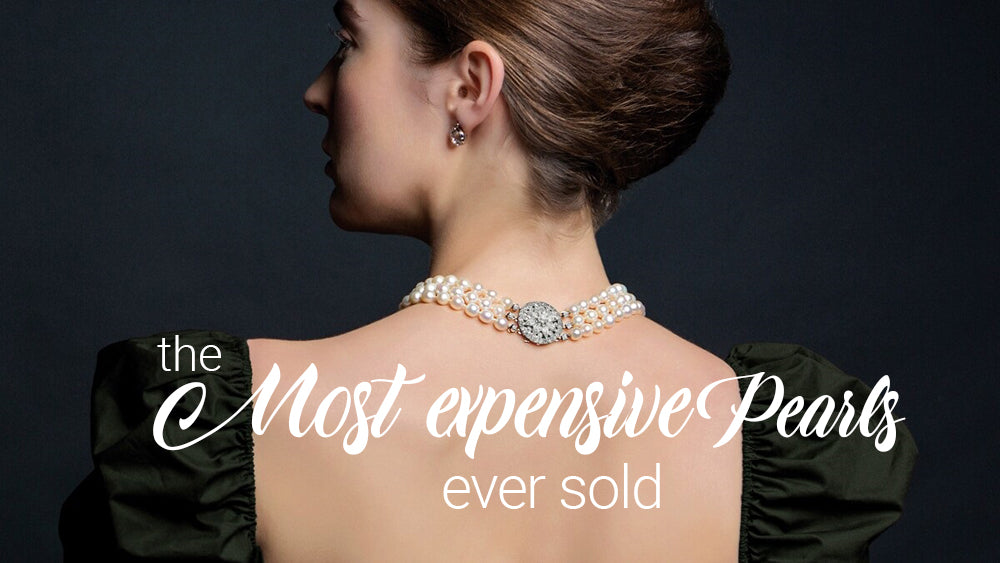
There’s just something about natural pearls, isn’t there? Their gorgeous glow that emanates from within and without, natural iridescence and wonderfully complex coloration ensures that natural pearls will always be coveted by jewel collectors the world over until the end of time.
To whit, may I present the most updated, current list of the Top 10 Most Expensive Pearls in History, as of 2023. Some favorites have dropped off the usual lists, and new, even more illustrious and record-shattering pearls have attained new places in history.
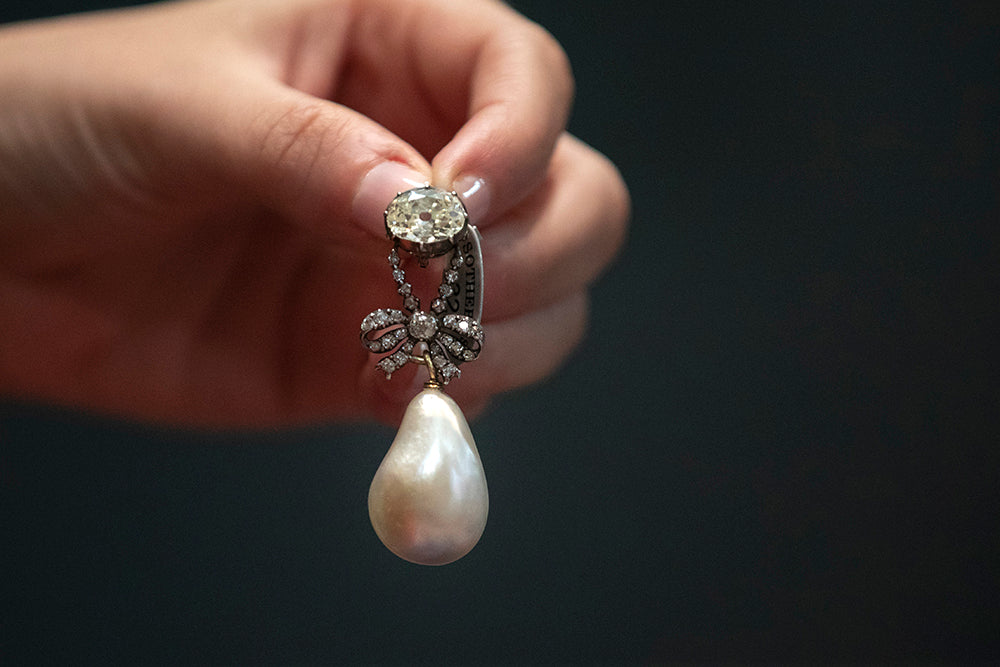
Photo courtesy of Sotheby's Auction House
The infamous Queen of France, Marie Antoinette (1755-1793), had a fabulous and storied jewelry collection worth millions of livres at the time of her reign. Some of it was accounted for after her attempt to flee Versailles during the French Revolution, however much of her collection was smuggled out of the country to Belgium and later on to Vienna.
She arranged to have shipments of her jewels couriered with the imperial ambassador to France, the Comte de Mercy Argenteau, with the instructions that the jewels were to be delivered to the Queen’s sister, Archduchess Marie Christine, governor of Brussels, and later held in safe keeping by her cousin, Emperor Franz II of Vienna. The King, Queen and their children were all captured and imprisoned before they could escape, with all family members executed at a later date with the exception of one daughter Marie Thérèse de France, later known as Madame Royale. She was allowed to live, and was later sent into exile in Vienna with her older cousin, Emperor Franz II.
Madame Royale inherited her mother’s incredible jewelry collection, and it has remained passed down through the Bourbon Parma family for nearly 200 years.

Photo courtesy of You Magazine who were extremely fortunate to be able to photograph the jewels using their own models.
The illustrious natural pearl and diamond pendant came to auction for the first time in November of 2018, and was handled by famed auctioneer, Sotheby’s. The pearl is a semi-baroque drop-shape measuring 15.90 x 18.35 x 25.85mm, and is held by a hinged-closure bale featuring a bow motif and a large oval diamond set in the center. Originally estimated to sell for $1,000,000 - $1,900,000, the prestigious provenance of the piece set the auction world on fire and the pendant eventually ended up smashing all previous records for natural pearls at auction, selling for about $36,500,000.00 making it THE most expensive pearl ever sold in history.

Photo courtesy of Sotheby’s

Photo courtesy of Sotheby’s
Also part of the record-setting auction at Sotheby's was Marie Antoinette’s Three-Strand Natural Pearl and Diamond Necklace, also a part of the fabulous jewelry collection smuggled out of France during the revolution. The slightly graduated pearl strands feature 119 off-round to button-shaped natural pearls measuring 7.30-9.30mm approximately and finished with a circular diamond clasp with a star motif, sparkling with a mix of round, cushion and rose-cut diamond accents.

Photo courtesy of You Magazine
While only fetching $2,200,000.00 at the same auction, the pearl necklace is still a very important piece of history. The three-strand pearl and diamond necklace is mentioned numerous times in Antoinette’s jewelry inventories, and was given to her by her mother Empress Marie Therese. The necklace’s original layout was a long Triple Strand and was later restrung into a single long sautoir of 160 pearls. Later after single long strands were considered out of fashion the necklace was restrung again into its current configuration of a three-strand necklace of 119 pearls, and a another single-strand necklace of similar size. For more information on Marie Antoinette’s pearls, Sotheby’s has written extensively on the jewels – highly recommended!
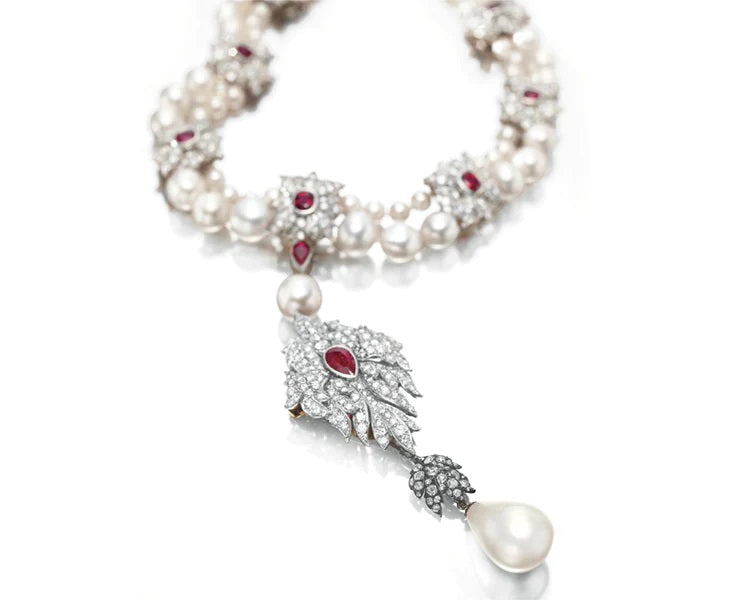
Of course perhaps the most famous pearl in the world, La Peregrina, also called “The Wanderer” or “The Pilgrim” simply must be on this list. Previous La Peregrina held the title of “most expensive pearl in history” until 2018.
The stunning drop-shaped natural pearl was originally found by an African slave in the Gulf of Panama and was brought back to King Philip II of Spain along with his bride to be, Mary I of England, and became part of the Spanish Crown Jewels for 250 years.
The pearl then came into the possession of the Bonaparte family in 1808 when Joseph Bonaparte (Napoleon’s elder brother) took the Spanish throne. While he was forced to flee in 1811, he kept La Per the Duke of Abercorn in England, and it remained with that family for almost a hundred years. The Wanderer then traveled to an auction house, where it was purchased by actor Richard Burton as a Valentine’s Day gift for his wife, Elizabeth Taylor in 1969 for the stunningly low sum of $37,000.00.

Elizabeth Taylor famously wore La Peregrina as part of her costume while filming the movie “The Tudors”.
Taylor adored La Peregrina and wore the pearl in many different settings over the years until finally having Cartier design an incredible necklace of pearls, diamonds and rubies to showcase the stunning pearl. The famous necklace features a large outer row of cultured button-shape and oval-shaped White South Sea pearls, and a smaller inner row of round cultured pearls, accented with floral-motif spacers featuring oval-cut Rubies surrounded by sparkling diamonds.
After her death in 2010, Taylor’s infamous jewelry collection was put up for auction at Christie’s where La Peregrina sold for a eye-watering $11.8 million.

Photo credit: Christie's Auction House
This sumptuous seven-strand “Festoon” necklace features 614 pearls that graduate from 5.1-17.05mm with off-round to button-shapes and featuring a gorgeous Cream to Rose Overtones. The 35-Inch Opera Length Necklace is finished with a sparkling platinum and white gold clasp, sparkling with Cushion and Old-Mine Cut diamonds.
The original owner is said to be a royal family, but the name remains undisclosed per Christie’s. Examined by the Swiss Gemological Institute, the pearls are incredibly well-matched for a natural saltwater pearl necklace – which is almost unheard of.
An Appendix letter attached to the report titled "Exceptional Natural Pearl Necklace" indicated that "These pearls exhibit a smooth pearl surface, resulting in a fine and matching pearl luster. Their colour subtly ranges from white to cream, partly with distinct rosé and green overtones. These overtones - poetically also referred to as the 'Orient of the pearls' - are an iridescence effect caused on the surface of pearls and contribute greatly to the beauty of these pearls."
There is speculation that the pearls are from the Pinctada radiata oyster, which is native to the Persian Gulf. P. radiata typically produces pearls in the 3.0-8.0mm size range, however larger specimens have definitely been recorded. The Persian Gulf was once renowned for their wealth of natural pearls, but in modern times the oyster beds have been depleted with the Gulf being both over-fished and contaminated due to oil drilling. Within the last decade or so, major investments have been made in order to rehabilitate the oyster populations and bring back the natural pearl industry to the Gulf.
The astonishing seven-strand “Festoon” pearl necklace is the 3rd most expensive pearl necklace in the world. Originally evaluated at $3,000,000.00, the spectacular size, color, exceptional matching and natural pearl distinction caused the pearls to eventually fetch a record-setting $9,081,662 at Christie’s Magnificent Jewels Auction in 2013.


This intricate Ceremonial Pearl Necklace, or Chaozhou, worn by Emperor Yongzheng who ruled China from the Forbidden City certainly deserves a place on our List! Meticulously crafted, and exceptional in nature the Chaozhou is a necklace that is best described as a Buddhist rosary, or prayer beads. The rules for creating a Chaozhou were strictly observed; the sequence must include 108 beads with a different colored bead called the fotou or Buddha's head, spaced between sequences of 27 beads. There are also three strands called jinian which extend at either side, and a ornamental strap in the back, finished with a green foutouta or Buddha head stuppa. For the royal family, pearls and four large coral beads, beads of lapis lazuli and jinian made with turquoise were specified.

This particular Chaozhou is extremely rare and very valuable, and is thought to have been created sometime between 1722-1735 for the Emperor. The use of natural Freshwater pearls, or dontzhu was reserved exclusively for the royal family, and there are only 5 known examples of Chaozhou using Eastern Freshwater pearls in all of China today. The use of the very fine, large (9.6-10.65mm) and perfectly matched, flawless white Freshwater pearls (which still have their luster and Orient intact 300 years later!) is exceedingly rare.
Says Alain Truong, “The significance of freshwater pearls to the Emperor cannot be emphasized enough. Eastern pearls were harvested from the three main rivers in Manchuria, the Yalu, Sungari and Amur. Hence they were treasured by the Manchu rulers for their association with their 'homeland'. Rules also specified that only the emperor and his family members were allowed to wear this precious pearl that was made into necklace or sewn into Imperial robes.”
The Chaozhou was sold at Sotheby’s Hong Kong for a staggering $8.7 Million in April, 2010 making it the 4th most expensive pearl necklace ever sold.

Photo courtesy of ResearchGate
The legendary Baroda pearls was originally an exception 7-strand natural pearl necklace worn by the Maharajas of India. The natural saltwater pearls likely originated from the southern coasts of India, which for centuries was a famous center for natural pearls.
The Double-Strand Baroda pearl strands sold at auction numbered 68 pearls measuring 9.47-16.04mm in size – extremely impressive sizes for natural pearls! Finished with a custom-designed foliate Cartier clasp set with Old Mine diamond weighing 8.57 carats with circular-cut accents all mounted in platinum.
The necklace sale included a pair of matching natural pearl and diamond earrings measuring 13.34 - 15.08 x 22.26mm and 14.40 - 15.01 x 21.05mm respectively with button-shaped natural pearl surmounts. Also included was a natural pearl and diamond brooch and natural pearl and diamond ring to complete the suite.


Above is the 12th Gaekwad Maharajah Sayaji Rao III, wearing the full seven-strand natural pearl necklace. The pearls became instantly famous when this portrait was featured in the "Book of the Pearl", published in 1908 by storied Tiffany's gemologist George Frederick Kunz who described the Baroda jewelry collection as ''among the greatest jeweled treasures of India”.
Christie’s says it best: “Worn through the centuries and across generations by the Indian Maharajas of Baroda, this necklace has been documented endlessly as the epitome of elegance, extravagance and rarity, sentiments embodied by the powerful and endearing Gaekwars of Baroda: "At certain seasons do the oysters lie, With valves wide gaping t'ward the teeming sky And seize the falling dews, and pregnant breed The shining globules of the 'Ethereal seed." (Marbodus Redonensis (ca. 1035-1123).”
To learn more about the infamous Baroda pearls and the Maharajas that owned them for centuries, visit the Christie’s auction website here.
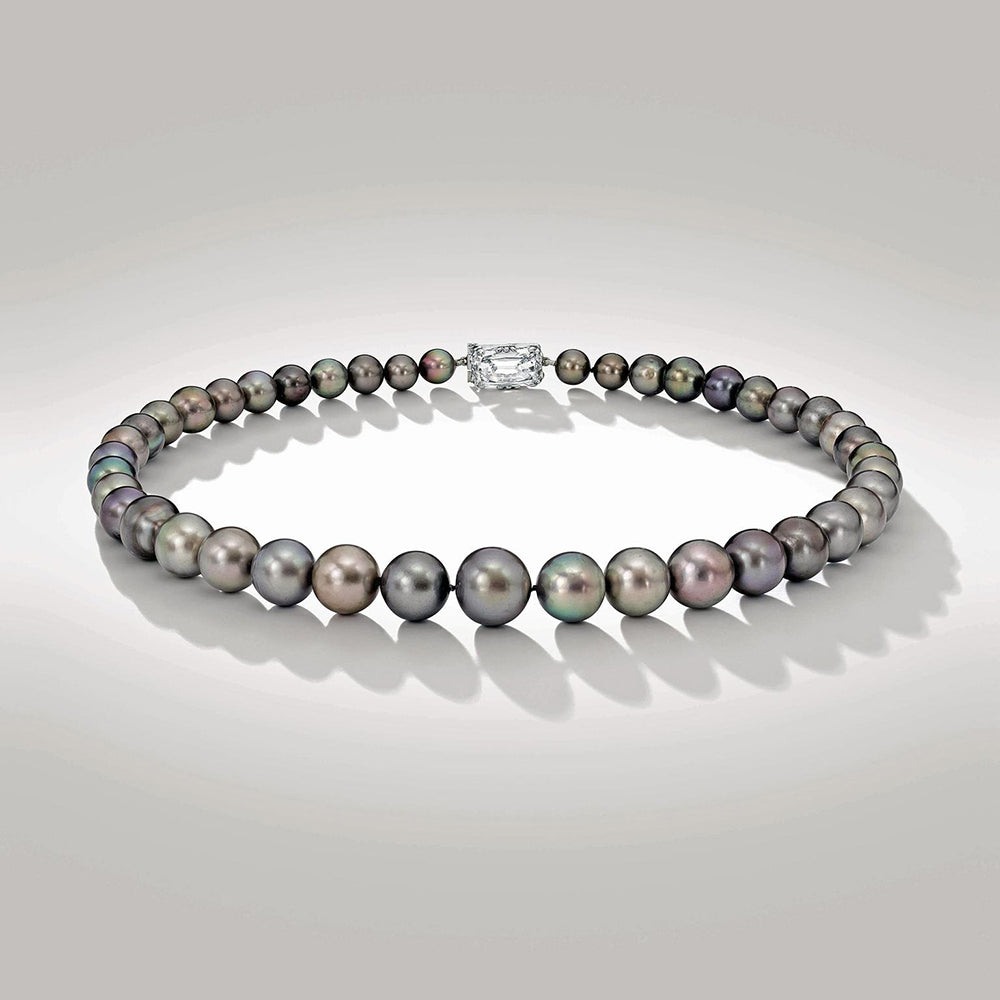
Photo courtesy Christie's
Perhaps the most famous and expensive natural Black Pearl Necklace in existence, the Cowdray pearls were originally owned by Lady Pearson, the Viscountess Cowdray who passed away in 1932. The necklace consists of 38 natural Tahitian pearls with a Medium Charcoal Grey body color with varying Overtones of Peacock, Silver, Rose, Blue-Green and Bronze, strung and finished with a large rectangular diamond clasp created by Cartier.
Originally a strand of 42 pearls graduating from 6.8-11.4mm in size, two pearls on the necklace were removed and made into earrings by a later owner who purchased the pearls the first time they were at auction in 1937. The pearls were lengthened back to the original 42 count of pearls in 2012 using exceptional Tahitian pearls to blend into the strand.

Photo credit The Jewellery Editor
The Cowdray Pearls were previously auctioned at Christie’s in 2007, fetching $3 million, and just 8 years later reappeared at Sotheby’s auction house in Hong Kong selling for a record-setting $5.3 million. This distinguishes the Cowdray Pearls as the most expensive black pearls in the world, and the 6th most expensive pearls in the world.

Photo credit: Christie's Auction House
This magnificent Four-Strand Black Natural Saltwater Pearl Necklace set records for the world’s most expensive black pearl necklaces ever brought to auction in April of 2015 at Christie’s annual Magnificent Jewells Auction. The four strands consist of 289 natural saltwater black pearls, shimmering with a spectacular rainbow of Peacock, Green, Blue-Green, Aubergine, Rose, Bronze, Pistachio and Silver.
 Photo courtesy Alain R. Truong
Photo courtesy Alain R. Truong
Not much is known about where the pearls originated, and the current owner remains anonymous … so we’ll just have to wait until it comes up for auction again in the future to get more details about the mystery pearls.
What we DO know is that the four strands consist of pearls ranging from 4.9mm to 12.65mm in size; the strands contain 63, 69, 76 and 81 pearls respectively, beautifully graduated and matched for size and shape. The necklace is finished with a squarish Cushion-Cut diamond weighing 3.03cts, surrounded by Old European cut diamond accents set in silver-topped white gold. Natural saltwater pearls that are black in color are some of the world’s rarest gemstones, and this four-strand Black Pearl Necklace is an awe-inspiring confection of dark beauty. We look forward to seeing it’s reappearance someday.
 Photo credit: Christie’s
Photo credit: Christie’s
Large, luxurious and absolutely lovely, this famous natural pearl necklace clocks in at #9 on our Top Ten Most Expensive Pearl Necklaces in history. The pearl necklace’s history stretches back to Imperial Russia; it originally was owned by the Dowager Empress Maria Feodorovna. In 1929 she sold the pearls to King George V of England, who then gifted the pearls to his wife, Queen Mary of England. The pearls were passed down to her heir, Edward Duke of Windsor, next in line to the throne. He then gave the natural pearl necklace to his bride, Bessie Wallis-Simpson when they married in 1937.
The Windsor pearl necklace has 28 natural pearls with a creamy white color, graduating in size from 9.2mm to and impressively large 16.8mm, leading us to believe the pearls are likely Australian in origin as the Pinctada maxima pearl oyster grows up to a foot in diameter and is famous for producing large, high quality South Sea pearls. The natural South Sea pearls have Round, Oval, Drop and Button-Shapes, all symmetrically shaped.

Photo courtesy Sotheby’s
Queen Mary had the pearls restrung with a custom diamond clasp by Cartier, and the final necklace measures just 14-Inches in length, meant to be a tight choker necklace. The Cartier-designed clasp has two Emerald-Cut diamonds weighing 2.00cttw, with two Fancy-Cut Trapezoid diamonds set on the outer sides weighing another 2.00cts, and then surrounded by 20 Single-Cut Round diamonds totaling 0.70cts.
Later, the Duke of Windsor commissioned Cartier to create a large, Drop-Shaped natural pearl pendant and round natural pearl earrings to make a new matching suite of pearls for his wife in 1950. The Duchess of Windsor passed away in 1986, and her jewelry collection was given to the French Research Institute with the stipulation that the jewels were to be auctioned off in order to fund their medical research in AIDS and cancer therapies. Sotheby’s auctioned the pearl necklace in 1987 where it was bought by fashion designer Calvin Klein for his wife, Kelly Klein for $733,000.00

Klein treasured the necklace and wore it for two decades before deciding to put the pearls back on the auction block. In 2007, the pearls were sent to the famous auction house Sotheby’s as part of their Magnificent Jewels Sale, and were promptly exhibited on a worldwide tour to major cities across Asia, Europe, the Middle East, and the U.S, showcasing their exceptional beauty and historical significance. They sold in December 2007 for $4.8 million.
Kelly says: “These pearls hold a very special place in my heart. They were a present from Calvin early on in our relationship. They represent passion, tenderness, and a promise about the future. Pearls, in my mind, are different from diamonds or gold. They are warm, mysterious, a small miracle created by nature.” We couldn’t agree more!

The Cartier pearls are a very significant piece of jewelry history, and the name Cartier has become synonymous with luxury and extravagant jewels. By 1912, Pierre Cartier had established himself as a preeminent jeweler and gemologist amongst the New York aristocracy, having dealt with some extremely high-end gemstones and clientele, such as brokering a sale of the famous Hope Diamond … still however, he needed a grand storefront location to house his collections and an elegant salon where his clients could browse his jewelry in leisure and in an appropriately opulent setting.
One item Cartier possessed was this natural double-strand white pearl necklace finished with a diamond clasp he designed himself. These pearls caught the eye of “Masie” Mae Caldwell Manwaring, who had married industrial railroad tycoon Morton Plant. She fell head over heels in love with the pearl necklace, and insisted that she had to have it.

Painted portrait of “Maisie” Mae Plant wearing the famous Cartier Double-Strand Pearl Necklace
Morton, in love with his new wife, made a deal with Cartier to purchase the necklace for $100.00, and included the sale of his mansion on Millionaire’s Row which he had been intending to move out of once construction of a new home was completed. Thus, Cartier made the real estate deal of the century, securing the perfect new salon for his business (which still stands today!), and the Plants walked away with an historically valuable strand of pearls. The necklace lives on in infamy as the pearls that established Cartier’s jewelry headquarters in New York City. The Cartier address has undergone two renovations – one in 2001 and the latest in 2016. To celebrate the most recent update, Cartier released a stunning commemorative three-strand natural pearl and diamond necklace (see below).
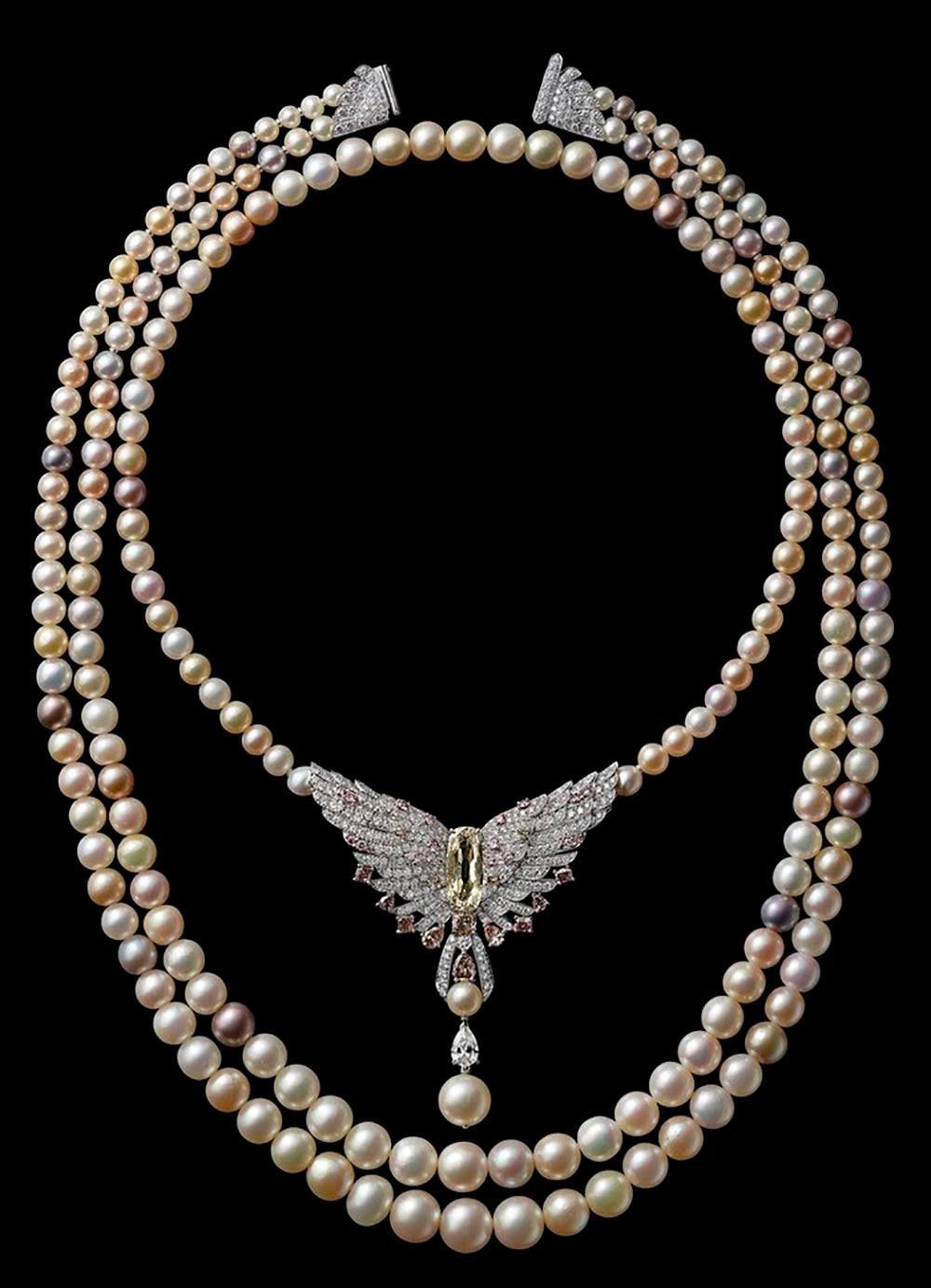
Photo courtesy Cartier
The pearls themselves consist of two strands of natural saltwater South Sea pearls, graduating from 6.5mm to 12.25mm in size. The inner string features 59 pearls, and the outer strand has 61 pearls; the strings are finished with a minimalist yet impressive 3.00ct Cushion-Cut diamond clasp mounted in a simple Platinum setting. The pearls disappeared for many years after initially only fetching $181,000 at auction after Masie passed away in 1957 (they were originally valued at around $1.0 Million), and only resurfaced in the modern era at Christie’s Magnificent Jewels auction in 2012, this time selling for an impressive (but we feel, on point) $3.7 Million.
*** BONUS ROUND ***
One other notable pearl necklace includes:

Photo credit: Bonhams
Even though this list should stop at the Top Ten Most Expensive Pearl Necklaces ever sold, I couldn’t resist including the fabulous and storied Dodge Pearl Necklace. This stunning three strands of natural pearls are strung in a single strand and a matching double-strand layout, consisting of 224 high quality, round pearls measuring 4.2mm to 10.25mm in size. Finished with an Art Deco style diamond clasp created by Cartier circa 1920, with an Old Cushion Cut center diamond weighing 1.95 carats with two Swiss Cut sister diamonds set to either side weighing 1.75cttw, surrounded by Round Brilliant Cut diamonds weighing 3.75 carats, all mounted in platinum.

Photo credit: Bonham’s
The gorgeous white pearl necklaces were said to have originated in Imperial Russia, and legend has it, previously owned by Russian Empress Catherine the Great. After the Russian Revolution and overthrow of the Tsar, many Imperial jewels were either smuggled out of the country or sent to auctions; the Dodge Pearl Necklace was purchased by Pierre Cartier (an avid pearl collector and lover of Russian Imperial jewelry styles), and then subsequently sold to Horace Dodge, a self-made billionaire who founded the Dodge Motor Company.
Dodge purchased the necklace for his beloved wife, Anna, whom he told she could have any earthly thing she wanted. She decided upon pearls. According to Alain R. Truong’s extensive documentation on the history of this pearl necklace, Anna only wore the pearls publicly twice in her life (can you imagine?!) before willing them to her granddaughter Yvonne Dodge.
 Photo courtesy of Alain R. Truong
Photo courtesy of Alain R. Truong
The original necklace consisted of 5 strands of pearls (numbering 389 in total) that could be converted into different styles and layouts, finished with an enamel clasp representing Catherine The Great, Empress of Russia, along with two diamond accented alternate clasps that could be used. Yvonne split the five-strand necklace into long single strands and gave them to her friends and heirs. Later members of the Dodge family decided to reunite 3 of the strands and have them recombined into the famous triple strand pearl necklace we know and love today.
 Photo courtesy of Bonham’s
Photo courtesy of Bonham’s
The storied and stunning Dodge Pearl Necklace was sent to Bonham’s Auction House in December of 2008, and it ended up selling for a healthy $600,000 and ten years later was sold at Christie’s Magnificent Jewels Auction in 2018 for a cool $1.1 Million.
So that’s it! The newest, most updated Top 10 list of the Most Expensive Pearl Necklaces Ever Sold, as of March 2023. We lost some favorites, such as the Barbara Hutton / Marie Antoinette natural pearl necklace, while gaining new glamorous strands to droll over.
I think that the stories and beauty of the pearls listed here only reinforce the worldwide, timeless romance that men and women alike have with these lustrous and iridescent gemstones.
What do you think? Which pearl necklace is your favorite?
Until next time!
XO,
Ashley
Free 2-Day FedEx on all orders within the USA. Overnight delivery options start at $35.
Most orders ship within 1-2 business days, sometimes same day.
International shipping is affordable and fast. Most international packages arrive in 2-4 business days.
Your package is fully insured. If your order is lost or stolen before delivery, we got you covered.
Our Pricing Explained
Luxury Grade Pearls. Lower Prices.
Luxury Grade Pearls.
Lower Prices.
The true value of pearls lies in their quality. We sell true luxury grade pearls without traditional luxury store markups.
We source the worlds finest pearls and sell direct to customers like you. You can expect to save about 1/2 the cost of traditional retail.


Pure Pearls Pricing

Traditional Retail Pricing